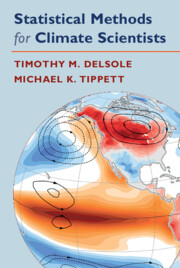Book contents
- Frontmatter
- Contents
- Preface
- 1 Basic Concepts in Probability and Statistics
- 2 Hypothesis Tests
- 3 Confidence Intervals
- 4 Statistical Tests Based on Ranks
- 5 Introduction to Stochastic Processes
- 6 The Power Spectrum
- 7 Introduction to Multivariate Methods
- 8 Linear Regression: Least Squares Estimation
- 9 Linear Regression: Inference
- 10 Model Selection
- 11 Screening: A Pitfall in Statistics
- 12 Principal Component Analysis
- 13 Field Significance
- 14 Multivariate Linear Regression
- 15 Canonical Correlation Analysis
- 16 Covariance Discriminant Analysis
- 17 Analysis of Variance and Predictability
- 18 Predictable Component Analysis
- 19 Extreme Value Theory
- 20 Data Assimilation
- 21 Ensemble Square Root Filters
- Appendix
- References
- Index
13 - Field Significance
Published online by Cambridge University Press: 03 February 2022
- Frontmatter
- Contents
- Preface
- 1 Basic Concepts in Probability and Statistics
- 2 Hypothesis Tests
- 3 Confidence Intervals
- 4 Statistical Tests Based on Ranks
- 5 Introduction to Stochastic Processes
- 6 The Power Spectrum
- 7 Introduction to Multivariate Methods
- 8 Linear Regression: Least Squares Estimation
- 9 Linear Regression: Inference
- 10 Model Selection
- 11 Screening: A Pitfall in Statistics
- 12 Principal Component Analysis
- 13 Field Significance
- 14 Multivariate Linear Regression
- 15 Canonical Correlation Analysis
- 16 Covariance Discriminant Analysis
- 17 Analysis of Variance and Predictability
- 18 Predictable Component Analysis
- 19 Extreme Value Theory
- 20 Data Assimilation
- 21 Ensemble Square Root Filters
- Appendix
- References
- Index
Summary
Field significance is concerned with testing a large number of hypothesis simultaneously. Previous chapters have discussed methods for testing one hypothesis, such as whether one variable is correlated with one other variable. Field significance is concerned with whether one variable is related to a random vector. In climate applications, a characteristic feature of field significance problems is that the variables in the random vector correspond to quantities at different geographic locations. As such, neighboring variables are correlated and therefore exhibit spatial dependence. This spatial dependence needs to be taken into account when testing hypotheses. This chapter introduces the concept of field significance and explains three hypothesis test procedures: a Monte Carlo method proposed by Livezey and Chen (1983) and an associated permutation test, a regression method proposed by DelSole and Yang (2011), and a procedure to control the false discovery rate, proposed in a general context by Benjamini and Hockberg (1995) and applied to field significance problems by Ventura et al. (2004) and Wilks (2006).
Keywords
Information
- Type
- Chapter
- Information
- Statistical Methods for Climate Scientists , pp. 298 - 313Publisher: Cambridge University PressPrint publication year: 2022
Accessibility standard: Unknown
Why this information is here
This section outlines the accessibility features of this content - including support for screen readers, full keyboard navigation and high-contrast display options. This may not be relevant for you.Accessibility Information
- 1
- Cited by
